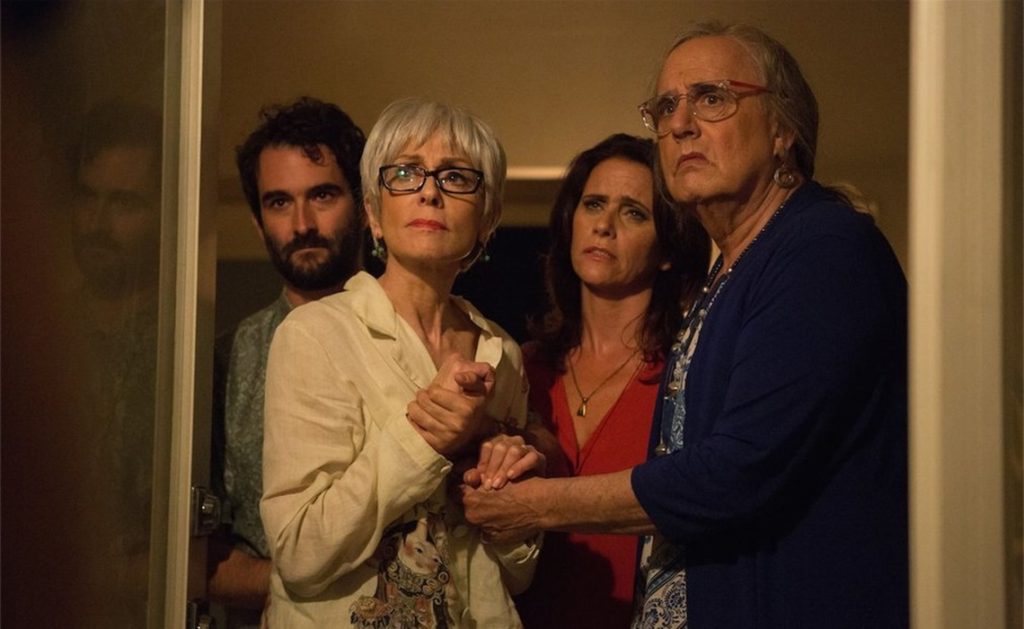Good Riddance, Transparent
Written by Ian Thomas Malone, Posted in Blog, Pop Culture
Criticizing Transparent has always been weird for me as a transgender woman, knowing that the very existence of the show was a step in the right direction for a marginalized and underrepresented community. The show has served as a great source of employment for the transgender community. The recent sexual misconduct allegations made against Jeffrey Tambor by two of the show’s transgender staff, which lead to his departure from the series, is upsetting for many reasons. The fact that Transparent is likely finished as a series is not one of them.
Transparent is not a show about transgender people. There is a transgender character in the lead role, played by the decidedly non-transgender Tambor, but the show is mostly about Maura’s angst riddled family, the upperclass Pfeffermans from Los Angeles. Stylistically, the show has strong roots with the mumblecore genre, seen in Girls, Togetherness, and Looking, complete with the presence of mumblecore legend Jay Duplass (also non-transgender) in the main cast. For those unfamiliar with the mumblecore movement, it is a genre defined by seemingly aimless narratives and characters who are often derided as “adult children,” usually quite accurately.
Transparent was always about that, the melancholy trials and tribulations of being wealthy and sad in 21st Century America. As a fan of mumblecore, I’ve always been apprehensive about disliking the show for being a part of that movement, but the experiences that mumblecore often depicts are far removed from the issues that affect transgender people in every day life. Transgender people face immense discrimination at work, which is fundamentally linked to our ability to afford medical treatments as simple as HRT, where the difference between $10 prescription and one costing $300 is mostly a matter of employment (due to our healthcare system), at a time when elected politicians fight to allow companies the ability to fire us at will. It would have been nice if Transparent could have focused more on those issues and less on all the orchestra of whining done by the adult Pfefferman children. The show hasn’t been cancelled yet, but it wouldn’t lose much of a beat if it kept going. The lack of a transgender lead hardly changes the show, which has been its problem all along.
The mumblecore comparisons do help in one key regard. Transparent represents the transgender community about as well as Girls accurately depicts Brooklyn millennials. To be fair, It is hard to say what kind of television show could ever represent such a diverse group as the transgender community, but a whiny affluent family from Los Angeles does not immediately come to mind as the model I would use. HBO’s Looking serves a great contrast as a mumblecore style show that depicted San Francisco’s gay community. It wasn’t necessarily a show strictly about being gay, but its use of a predominantly gay cast & crew gave the aura of authenticity that eluded Transparent. Being trans was never firmly rooted in Transparent’s zeitgeist. How could it have been?
In The Transgender Manifesto, I make the fairly simple observation that transgender people are fully capable of playing any character, cisgender or otherwise. Fictional narratives rarely dive into the subject of transgender identity, and the presence of a transgender character does not require one to do so. We are in fact, people. Representation in film and television is still to this day a huge issue for people who are not white and male. The idea of a black Othello was once seen as an outrage, despite the character’s own background. We’ve come a long way since then, but we couldn’t have a transgender lead in a show that traded off transgender people to diversify itself in a crowded field.
And yet, we had Transparent, the transgender show that wasn’t about transgender people. Yes, it increased our visibility (what that actually means, I’m not quite sure) and it certainly employed transgender people. I guess that counts for something. It is a poor depiction of transgender life. It didn’t need to be. The transgender community deserves better.











